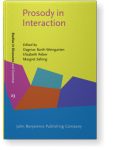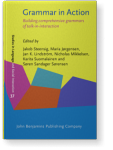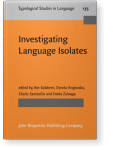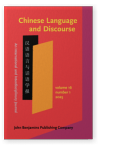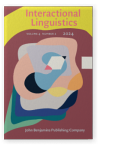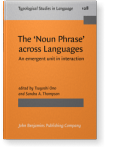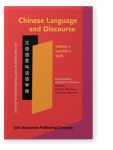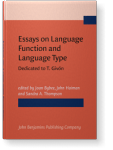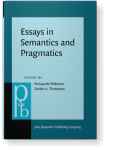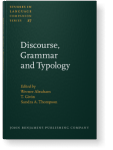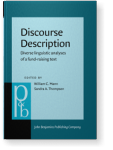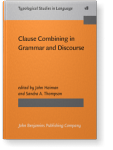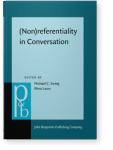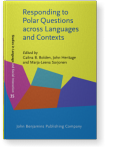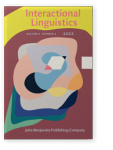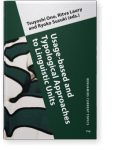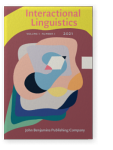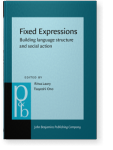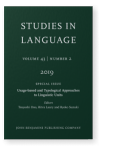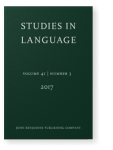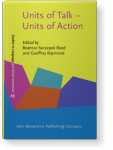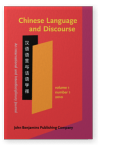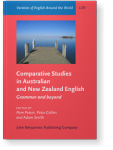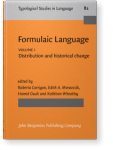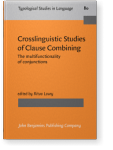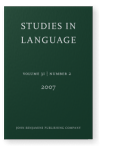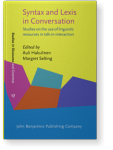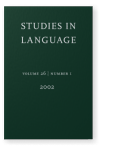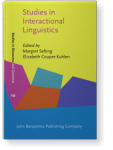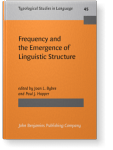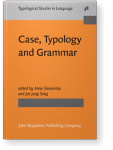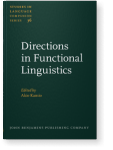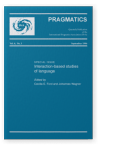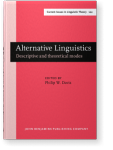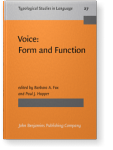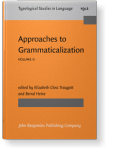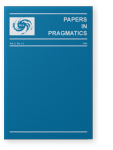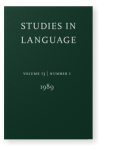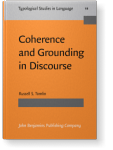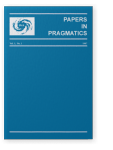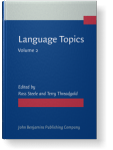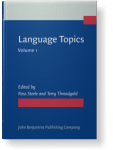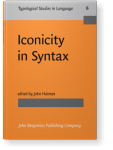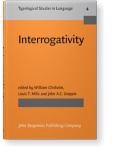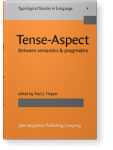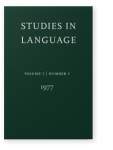Sandra A. Thompson
List of John Benjamins publications for which Sandra A. Thompson plays a role.
Book series
ISSN 1879-3983
Journals
ISSN 1877-7031 | E-ISSN 1877-8798
ISSN 2666-4224 | E-ISSN 2666-4232
The ‘Noun Phrase’ across Languages: An emergent unit in interaction
Edited by Tsuyoshi Ono and Sandra A. Thompson
[Typological Studies in Language, 128] 2020. vi, 366 pp.
Subjects Discourse studies | Pragmatics | Syntax | Theoretical linguistics | Typology
Conversation Analysis in Chinese
Edited by Sandra A. Thompson and Ruey-Jiuan Regina Wu
Special issue of Chinese Language and Discourse 7:2 (2016) v, 166 pp.
Subjects Discourse studies | Pragmatics | Sino-Tibetan languages | Sociolinguistics and Dialectology
Essays on Language Function and Language Type: Dedicated to T. Givón
Edited by Joan L. Bybee, John Haiman and Sandra A. Thompson
[Not in series, 82] 1997. vi, 480 pp.
Subjects Functional linguistics | Theoretical linguistics | Typology
Essays in Semantics and Pragmatics: In honor of Charles J. Fillmore
Edited by Masayoshi Shibatani and Sandra A. Thompson
[Pragmatics & Beyond New Series, 32] 1996. x, 332 pp.
Subjects Pragmatics | Semantics
Discourse, Grammar and Typology: Papers in honor of John W.M. Verhaar
Edited by Werner Abraham, T. Givón and Sandra A. Thompson
[Studies in Language Companion Series, 27] 1995. xx, 352 pp.
Subjects Discourse studies | Functional linguistics | Pragmatics | Typology
Discourse Description: Diverse linguistic analyses of a fund-raising text
Edited by William C. Mann and Sandra A. Thompson
[Pragmatics & Beyond New Series, 16] 1992. xiii, 409 pp.
Subjects Discourse studies | Pragmatics | Theoretical linguistics
Clause Combining in Grammar and Discourse
Edited by John Haiman and Sandra A. Thompson
[Typological Studies in Language, 18] 1988. xiii, 442 pp.
Subjects Discourse studies | Pragmatics | Theoretical linguistics
2025 Chapter 3. ‘Idea-Suggestions’ in an interactional grammar: Sequential organization and grammatical formats Grammar in Action: Building comprehensive grammars of talk-in-interaction, Steensig, Jakob, Maria Jørgensen, Jan K. Lindström, Nicholas Mikkelsen, Karita Suomalainen and Søren Sandager Sørensen (eds.), pp. 47–77 | Chapter
In this chapter, we explore the grammar of ‘Suggestions’ and the sequences they engender. ‘Suggestion’ is used here as a technical term to refer to a speaker forwarding an action to be performed by the recipient that will benefit the recipient. The data suggest several sub-types of Suggestion,… read more
2024 Chapter 1. Toward the interactional relevance of (non)referentiality (Non)referentiality in Conversation, Ewing, Michael C. and Ritva Laury (eds.), pp. 1–10 | Chapter
2024 Chapter 7. The indeterminacy and fluidity of reference in everyday conversation (Non)referentiality in Conversation, Ewing, Michael C. and Ritva Laury (eds.), pp. 123–140 | Chapter
We focus on (a) the indeterminacy of reference, i.e., noun phrases which are described as having a ‘given’, ‘old’ or ‘definite’ referent, where that referent is unspecified; (b) the ways in which speakers shift reference between categorial and specific designations. The data reveal that talk… read more
2023 Chapter 12. Do English affirmative polar interrogatives with any favor negative responses? Responding to Polar Questions across Languages and Contexts, Bolden, Galina B., John Heritage and Marja-Leena Sorjonen (eds.), pp. 350–376 | Chapter
In research on talk-in-interaction, English affirmative polar interrogatives with any have been argued to favor a negative response, with supporting data drawn largely from medical interactions. Considering a range of mundane interactional settings, we find that the response favored by an… read more
2022 Can temporal clauses be insubordinate? Evidence from English conversation Interactional Linguistics 2:2, pp. 165–189 | Article
In this paper we aim to determine whether temporal clauses can be shown to be insubordinate in everyday American English interaction. In order to investigate grammatical insubordination in conversation, we operationalize the notion of ‘insubordination’ as a specific practice for designing a… read more
2021 Understanding ‘clause’ as an emergent ‘unit’ in everyday conversation Usage-based and Typological Approaches to Linguistic Units, Ono, Tsuyoshi, Ritva Laury and Ryoko Suzuki (eds.), pp. 11–37 | Chapter
Linguists generally assume ‘clause’ to be a basic unit for the analysis of grammatical structure. Data from natural conversations, however, suggests that ‘clause’ may not be grammaticized to the same extent across languages. Understanding ‘clause’ as a predicate (plus any arguments, inferred or… read more
2021 The grammar of proposals for joint activities Interactional Linguistics 1:1, pp. 123–151 | Article
The action of proposing has been studied from various perspectives in research on talk-in-interaction, both in mundane as well as in institutional talk. Aiming to exemplify Interactional Linguistics as a drawing together of insights from Linguistics and Conversation Analysis, we explore the… read more
2020 Chapter 12. What can Japanese conversation tell us about ‘NP’? The ‘Noun Phrase’ across Languages: An emergent unit in interaction, Ono, Tsuyoshi and Sandra A. Thompson (eds.), pp. 315–327 | Chapter
Our examination of Japanese everyday conversation reveals that a majority of candidate NPs cannot be established as NPs based on traditional criteria, i.e., marking by particles and modification, since they are generally unmarked and unmodified. We examine these cases to reveal the difficulty of… read more
2020 Chapter 5. English why don’t you X as a formulaic expression Fixed Expressions: Building language structure and social action, Laury, Ritva and Tsuyoshi Ono (eds.), pp. 99–132 | Chapter
In this chapter we examine a formulaic expression in English, why don’t you + action verb/predicate (= WDY). We show that WDY is used in everyday conversation to carry out the social work of giving advice, as in why don't you try taking it again? We argue that this construction is a formulaic… read more
2020 Chapter 1. Introduction The ‘Noun Phrase’ across Languages: An emergent unit in interaction, Ono, Tsuyoshi and Sandra A. Thompson (eds.), pp. 1–8 | Chapter
2019 Understanding ‘clause’ as an emergent ‘unit’ in everyday conversation Usage-based and Typological Approaches to Linguistic Units, Ono, Tsuyoshi, Ritva Laury and Ryoko Suzuki (eds.), pp. 254–280 | Article
Linguists generally assume ‘clause’ to be a basic unit for the analysis of grammatical structure. Data from natural conversations, however, suggests that ‘clause’ may not be grammaticized to the same extent across languages. Understanding ‘clause’ as a predicate (plus any arguments, inferred or… read more
2017 Negative scope, temporality, fixedness, and right- and left-branching: Implications for typology and cognitive processing Studies in Language 41:3, pp. 543–576 | Article
‘Negative scope’ concerns what it is that is negated in an utterance with a negative morpheme. With English and Japanese conversational data, we show that for an English speaker, calculating negative scope requires that recipients incrementally keep track of all the material in the clause that… read more
2016 Introduction Conversation Analysis in Chinese, Thompson, Sandra A. and Ruey-Jiuan Regina Wu (eds.), pp. 175–178 | Article
2013 Units and/or Action Trajectories? The language of grammatical categories and the language of social action Units of Talk – Units of Action, Szczepek Reed, Beatrice and Geoffrey Raymond (eds.), pp. 13–56 | Article
Responding to Sacks et al.’s 1974 call for linguists to join in the study of resources for turn construction, the authors of this chapter long ago took on turn formulation as an issue which linguists must account for. In this chapter, we return to this aspect of CA’s charge to linguists, noting… read more
2010 Conversation, grammar, and fixedness: Adjectives in Mandarin revisited Chinese Language and Discourse 1:1, pp. 3–30 | Article
The categoriality of ‘adjectives’ has been a favorite topic of discussion in functional Chinese linguistics. However, the literature leaves us with no clear picture of the ‘adjective’ category for Mandarin. In this paper, we take a usage-based approach to revisit the issue of adjectives in Mandarin. read more
2009 Final but in Australian English conversation Comparative Studies in Australian and New Zealand English: Grammar and beyond, Peters, Pam, Peter Collins and Adam Smith (eds.), pp. 339–360 | Article
In contemporary Australian English but has progressed through a grammaticization continuum to become a “fully developed” final discourse particle. Here we document the place of Final Particle but in Australian English. Firstly, we make a case that it provides further evidence of the mixed origins… read more
2009 Fixedness in Japanese adjectives in conversation: Toward a new understanding of a lexical (‘part-of-speech’) category Formulaic Language: Volume 1. Distribution and historical change, Corrigan, Roberta, Edith A. Moravcsik, Hamid Ouali and Kathleen Wheatley (eds.), pp. 117–146 | Chapter
Japanese adjectives have received a fair amount of attention for their intriguing morphological and diachronic properties. Adjectives have also been discussed in the typological literature, largely in terms of their status as a lexical category vis-à-vis nouns and verbs. Rather little research has… read more
2008 Projectability and clause combining in interaction Crosslinguistic Studies of Clause Combining: The multifunctionality of conjunctions, Laury, Ritva (ed.), pp. 99–123 | Article
We examine a set of supposedly “biclausal” constructions in natural conversations in English and German, and argue that: (1) these constructions are not biclausal, since the second “clause” is typically not a clause but an indeterminate stretch of discourse without a consistent syntactic structure;… read more
2008 Introduction Crosslinguistic Studies of Clause Combining: The multifunctionality of conjunctions, Laury, Ritva (ed.), pp. ix–xiv | Miscellaneous
2008 The grammaticization of but as a final particle in English conversation Crosslinguistic Studies of Clause Combining: The multifunctionality of conjunctions, Laury, Ritva (ed.), pp. 179–204 | Article
We examine the behavior of turn-final but in a corpus of spoken American and Australian English, proposing two hypotheses. First, the behavior of but can be modeled as a continuum from a prosodic-unit-initial to a prosodicunit-final discourse particle. Second, as but “moves” along this continuum,… read more
2007 Relative Clauses in English conversation: Relativizers, frequency, and the notion of construction Studies in Language 31:2, pp. 293–326 | Article
This paper is a usage-based study of the grammar of that set of English Relative Clauses with which a relativizer has been described as optional. We argue that the regularities in the use of relativizers in English can be seen as systematically arising from pragmatic-prosodic factors, creating… read more
2005 A linguistic practice for retracting overstatements: ‘Concessive repair’ Syntax and Lexis in Conversation: Studies on the use of linguistic resources in talk-in-interaction, Hakulinen, Auli and Margret Selting (eds.), pp. 257–288 | Article
2002 “Object complements” and conversation towards a realistic account Studies in Language 26:1, pp. 125–163 | Article
Based on a corpus of conversational English, I argue that the standard view of complements as subordinate clauses in a grammatical relation with a complement-taking predicate is not supported by the data. Rather, what has been described under the heading of complementation can be understood in… read more
2001 Foreword Studies in Interactional Linguistics, Selting, Margret and Elizabeth Couper-Kuhlen (eds.), pp. vii–viii | Foreword
2001 Transitivity, clause structure, and argument structure: Evidence from conversation Frequency and the Emergence of Linguistic Structure, Bybee, Joan L. and Paul J. Hopper (eds.), pp. 27–60 | Article
1998 A discourse explanation for the cross-linguistic differences in the grammar of incorporation and negation Case, Typology and Grammar: In honor of Barry J. Blake, Siewierska, Anna and Jae Jung Song (eds.), pp. 307–340 | Article
1997 Discourse Motivations for the Core-Oblique Distinction as a Language Universal Directions in Functional Linguistics, Kamio, Akio (ed.), pp. 59–82 | Article
1996 Practices in the construction of turns: The “TCU” revisited Interaction-based studies of language, Ford, Cecilia E. and Johannes Wagner (eds.), pp. 427–454 | Article
1996 Preface Essays in Semantics and Pragmatics: In honor of Charles J. Fillmore, Shibatani, Masayoshi and Sandra A. Thompson (eds.), pp. vii–x | Preface
1995 What can conversation tell us about syntax? Alternative Linguistics: Descriptive and theoretical modes, Davis, Philip W. (ed.), pp. 213–272 | Article
1994 On “Middle Voice” Verbs in Mandarin Voice: Form and Function, Fox, Barbara A. and Paul J. Hopper (eds.), pp. 231–246 | Article
1992 Rhetorical Structure Theory and Text Analysis Discourse Description: Diverse linguistic analyses of a fund-raising text, Mann, William C. and Sandra A. Thompson (eds.), pp. 39–78 | Article
1991 A quantitative perspective on the gramaticization of epistemic parentheticals in English Approaches to Grammaticalization: Volume II. Types of grammatical markers, Traugott, Elizabeth Closs and Bernd Heine (eds.), pp. 313–330 | Article
1989 A Discourse Account of the Korean Accusative Marker Studies in Language 13:1, pp. 105–128 | Article
1988 Introduction Clause Combining in Grammar and Discourse, Haiman, John and Sandra A. Thompson (eds.), pp. ix–xiii | Miscellaneous
1988 The structure of discourse and ‘subordination’ Clause Combining in Grammar and Discourse, Haiman, John and Sandra A. Thompson (eds.), pp. 275–330 | Article
1987 “Subordination” and narrative event structure Coherence and Grounding in Discourse: Outcome of a Symposium, Eugene, Oregon, June 1984, Tomlin, Russell S., pp. 435–454 | Article
1987 Rhetorical structure theory: A framework for the analysis of texts IPrA Papers in Pragmatics 1:1, pp. 79–105 | Article
1987 Antithesis: a study in clause combining and discourse structure Language Topics: Essays in honour of Michael Halliday, Steele, Ross and Terry Threadgold (eds.), pp. 359–384 | Article
1987 Antithesis: a study in clause combining and discourse structure Language Topics: Essays in honour of Michael Halliday, Steele, Ross and Terry Threadgold (eds.), pp. 359–384 | Article
1985 The iconicity of the universal categories “noun” and “verb” Iconicity in Syntax: Proceedings of a symposium on iconicity in syntax, Stanford, June 24–26, 1983, Haiman, John (ed.), pp. 151–186 | Article
1984 Mandarin Interrogativity: A colloquium on the grammar, typology and pragmatics of questions in seven diverse languages, Cleveland, Ohio, October 5th 1981-May 3rd 1982, Chisholm, William, Louis T. Milic and John A.C. Greppin (eds.), pp. 47–62 | Article
1982 The Discourse Motivation for the Perfect Aspect: The Mandarin Particle LE Tense-Aspect: Between semantics & pragmatics, Hopper, Paul J. (ed.), pp. 19–44 | Article
